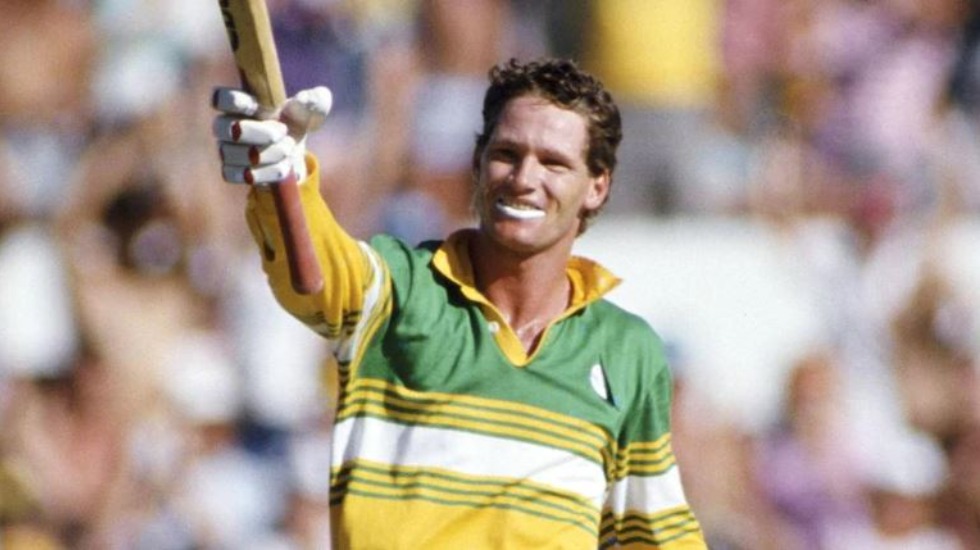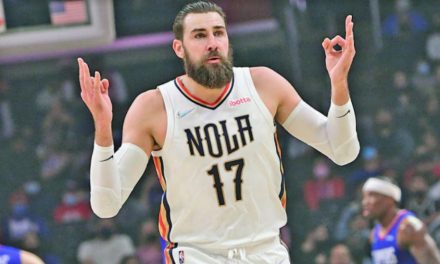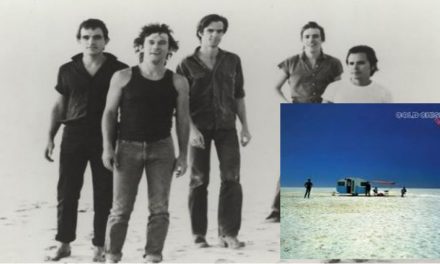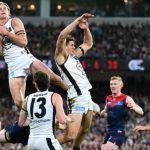Dean Jones: “He was colour and movement, emotions and impetuousness, joy and tantrum, falling down, getting back up.”
In the late 1980s and early ‘90s, there was no more loved sporting star in Melbourne than Dean Jones. In a city that crowns sporting heroes, he was our king.
Rohan Connolly tweeted that he was the Dermott Brereton of cricket – the brash, flamboyant hero of the era, and he was. But he was bigger, because we all barracked for “Deano”.
In the last 24 hours, so many of my generation have written beautiful tributes, whether they be long form or social posts.
The phrase “so Deano was their hero, too” has been uttered in minds across Australia today. Maybe we’ve only just realised how similar our childhoods were, and the role that he played in them.
Twice I queued at Angus and Robertson in Greensborough Plaza for that treasured meet and greet autograph of his books in the early ‘90s. All across social media are photos of similar meetings and images of his “keep smiling” autograph in books, still kept in immaculate condition and at the ready today.
So why was he a hero to so many? His place as the only great Australian bat from Victoria of his and surrounding generations is obvious, but the extent to which he was adored means it’s a lot more guttural than that.
In his autobiography, he talked about ‘nervous energy’, “some call it arrogance, some think Dean Jones is a bloody bighead”. Contemporaries like Marsh, Boon, the Waugh and Border were primarily blank, cool and stoic.
He was colour and movement, emotions and impetuousness, joy and tantrum, falling down and getting back up. He was a hyperactive child at the crease.
It was only natural that 10-year-olds would identify with this player more than others, even if opponents, teammates and older heads at times rolled their eyes. For good and bad, we knew exactly what Deano was thinking on the field, so we were drawn to him.
He also did things that we could mimic. We couldn’t play a back foot drive like Steve Waugh, but we could dance down the pitch, slog the ball for six, or scamper down the pitch like a madman.
Many invested in Deano, and when you did it was all chips in. My early cricket following memories were edge-of-the-seat affairs next to TVs or radios, hanging off every delivery.
You couldn’t just drift away, do something else and come back to him sedately moving along like you left him because every ball was a show and the plot twisted so often.
He could be the best batsman, the most explosive batsman, the gutsiest batsman, the most nervous batsman, the most out-of-sorts batsman and the most stupid batsman – all in the space of one over.
PLEASE HELP US CONTINUE TO THRIVE BY BECOMING AN OFFICIAL FOOTYOLOGY PATRON. JUST CLICK THIS LINK.
Following Deano was like riding a rollercoaster, you got dizzying highs and almost comical lows.
The apex of all things Deano happened on that magical Sunday morning in Brisbane late in 1990 when the country watched him take England apart and treat the one-day match as his own personal stage, making a then-Australian record 145. If you’re of that generation, it’s likely your most treasured pure cricket memory.
But I also remember the biting of fingernails early that year, riding every ball on radio as he ducked, weaved and nudged Australia home in a low-scoring one day final where Imran, Wasim and Waqar were rampant.
We then had that cruel injustice of his premature dumping a few years later. A kid could learn a lot about this harsh world while vicariously living his career.
He had his flaws and foibles, and most of us worshippers rolled our eyes many times over the years just like those contemporaries did once our childish wonder faded.
If you worked within cricket, you were bound to come across him, and from what I’d been told, chances are there would be at some point be a disagreement.
More than a decade ago I was due to have a meeting with him and others, but at the last minute I had to miss. I was relieved. I wasn’t sure I wanted to meet my hero, even though I still found him among the most interesting former players in print.
But then, in a different stint just a few years back, I did meet and speak to him on different occasions. We bought each other a beer one night, and it was great. He was my childhood hero. He wasn’t perfect, but he was friendly to me and, though I didn’t share it with him, still the biggest single personality that influenced my love of cricket.
The shock of your first sporting hero passing is one of those scary markers of time. To pass at 59 in a sudden, but natural manner is a check on everyone’s mortality. Its horribly sad for those that knew him well, and it’s a smothering sadness for the army that idolised him.
Statistics can too heavily dictate our following of sports and our judgements of history. Goals kicked, championships played in, races won, centuries scored.
Deano’s statistics tell a story of a very good Test player and an exceptional one-day player.
But perhaps the most important measure, far beyond wins and losses, is how many people in whom you sparked an interest in the game. How many people turned on their TV or radio to see how you were batting. And how many were to make that sport a lifelong love.
Going by what I experienced at the time, and by what I’ve read over the last 24 hours, on that score, Deano would perhaps rank as the greatest.












One Friday afternoon after work many years ago, myself and a couple of colleagues wandered down to the MCG to watch the last session of a Victorian Shield game from the comfort of the Long Room. Unbeknownst to us this final session was extended by an hour for some reason and Dean Jones just happened to be batting. We were fortunate to see him get his century just after the tea break and he had posted his 200 by stumps so were the fortunate few to see him get two centuries in a session. I doubt whether this has been achieved before or since at first-class level and it was a glorious display of batting in front of a crowd of maybe 100 people but an innings I will never forget. What did he do or say to incur the wrath of the national selectors? Did Bob Simpson have A hand in it? Like Laurie Nash before him, it is one of life’s mysteries, sigh ….
Great story Wally, thanks for sharing!
Thanks, Shannon. Nicely written.
Loved him as a player and whenever I saw something he’d written about cricket, I read it.
I recall the hatred for the “NSW establishment” when he was unceremoniously and prematurely dumped from the Test team (but it does highlight how few really good batsmen Victoria produces).
I really enjoyed this article, fantastic work. He was definitely my first cricket hero and most of the kids I played cricket with felt the same. As a Victorian, I had moved interstate so I was always supporting the VIC cricketers and he was my guy. I rode all of his innings the same way I support my footy club. Along with his contemporaries from the late 80’s early 90’s, they took Australian cricket back to world leaders where success became a non-negotiable once all of the Academy kids starting joining the squad. As a lot have commented over the past 24 hours, you forget just how big that triangular one-day series was each summer in Australia in those days. I remember an innings in a rain delayed one day final at the SCG against the West Indies (maybe 92/93) where Dean Jones and Steve Waugh spanked them all over the ground in one of the most amazing one day partnerships against an at the time the best in the world Windies – we were robbed with the result but I remember thinking not many batsmen had done that to them at the time.